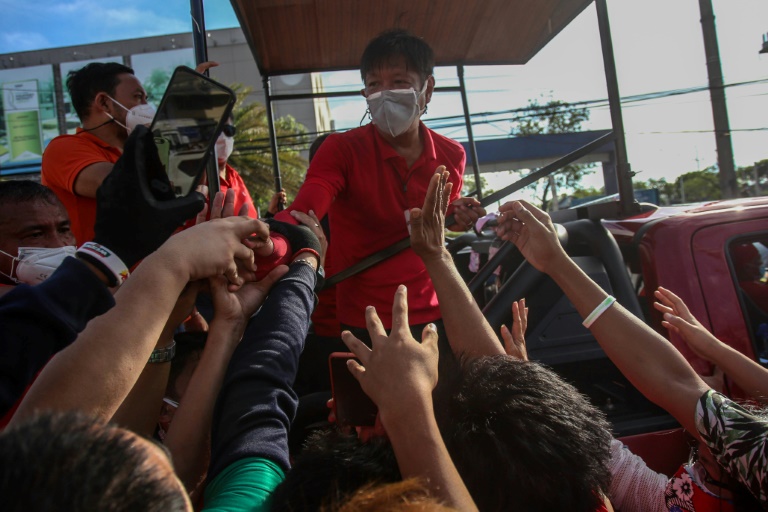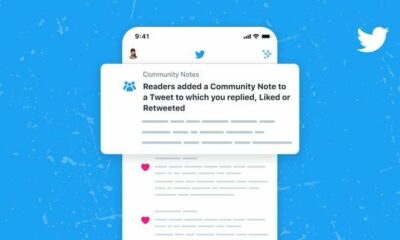SOCIAL
Marcos heir wins Philippine election misinformation race

Philippine social media has exploded with support for presidential election favourite Ferdinand Marcos Junior – Copyright AFP Jam STA ROSA
Faith BROWN
Philippine social media has exploded with support for presidential election favourite Ferdinand Marcos Junior, driven by a massive misinformation campaign aimed at revamping the family brand and smearing his top rival.
False and misleading claims have flooded Facebook, YouTube, TikTok and Twitter in the lead-up to the May 9 polls, pounding Filipinos with a relentless barrage of propaganda on platforms where they rank among the heaviest users in the world.
Voter surveys show the son and namesake of the country’s former dictator heading towards a landslide victory — the endgame of a decades-long, well-funded effort to return the family to the presidential palace they fled in disgrace in 1986.
Critics and opponents accuse Marcos Jr and his supporters of trying to portray his father’s two-decade rule as a golden age of peace and prosperity while whitewashing human rights abuses and the plundering of state coffers.
But the effort to make over the family’s image appears to be translating into votes among the largely young electorate and those nostalgic for the Marcos years.
Al Contrata, 25, was born a decade after a military-backed popular uprising toppled the dictator from power and chased the family into exile in the United States.
Facebook posts about the elder Marcos have persuaded him to vote for his son.
“I learned about the infrastructure that was built during the time of president Marcos. Since then, I saw him in a positive light,” said Contrata, a delivery driver near Manila, who voted for President Rodrigo Duterte in 2016.
“I think maybe Bongbong Marcos can continue what his father started,” referring to the candidate by his nickname.
– ‘Troll armies’ –
Election-related misinformation has focused primarily on the two presidential frontrunners, Marcos Jr and incumbent Vice President Leni Robredo, analysis by AFP’s Fact Check team and local fact-checking alliance Tsek.ph shows.
“Data show Robredo reeling from preponderantly negative messages and Marcos Jr enjoying overwhelming positive ones,” said Maria Diosa Labiste and Yvonne Chua of Tsek.ph.
They said the trend was reminiscent of the flood of posts about Duterte and his opponents in 2016 that were seen as key to his win.
Marcos Jr draws support from the family’s northern stronghold as well as his alliance with vice presidential candidate and first daughter Sara Duterte.
But social media’s influence is critical.
One major battleground is Facebook, the most popular platform in the Philippines and used by most of its 76 million internet users.
Since Marcos Jr’s narrow loss to Robredo in the 2016 vice presidential race, pro-Marcos pages have pumped out misinformation about everything from electoral fraud and the family’s wealth to economic achievements during his father’s rule.
Robredo, who trailed Marcos by 45 percentage points in the latest poll by Pulse Asia Research, has also been a major target.
Among the dozens of claims about the Marcoses debunked by AFP is the popular assertion that the patriarch made his fortune when he was a lawyer via a massive gold payment from a client.
AFP also fact-checked dozens of false or misleading claims about Robredo, including doctored photos and videos that aim to portray her as stupid, unfriendly towards voters or even a communist.
Activity has only intensified ahead of the 2022 elections, drowning out support for Robredo.
In the past year, there have been nearly 75 million interactions — reactions, comments or shares — with posts on more than a hundred pro-Marcos pages with at least 3,000 followers, according to data from social media monitoring platform CrowdTangle.
That compares with just over 39 million interactions for the same number of pages promoting Robredo.
When Robredo announced her presidential bid on October 7, interactions on pro-Marcos pages spiked to more than 1.8 million — about nine times the daily average.
Pro-Robredo pages received 487,000 interactions.
“It’s hard for the other campaigns to compete with the Marcos machinery online, because this is six years in the making,” said Cleve Arguelles, an assistant lecturer in political science at De La Salle University in Manila.
“They’ve really worked hard to dominate these spaces and they’re reaping the benefits of investing early in troll armies and building these online communities.”
It is not possible to tell how many of the pages were created by real supporters or the candidates.
In January, Twitter suspended more than 300 accounts reportedly linked to supporters of Marcos Jr, which the social media giant said had violated its rules on manipulation and spam.
Marcos Jr has denied using trolls.
In an interview with the One PH channel broadcast on Monday, he accused fact-checkers of sometimes having “their own agenda” and inventing quotes that they attributed to him.
“For me, I am the victim of fake news, because there are many things that were said about me that are not true,” Marcos Jr said.
– ‘Long-term investment’ –
Marcos Jr’s social media strength is the result of a “long-term investment” to rehabilitate the family brand, said Jonathan Corpus Ong, a disinformation researcher at the University of Massachusetts and Harvard University.
After the fallen dictator’s death in 1989, his heirs returned home and began their remarkable political comeback, getting elected to public office while distancing themselves from their past.
The Marcoses have previously denied local media reports that they asked the now-defunct British political consultancy Cambridge Analytica — at the centre of a Facebook data scandal in the past decade — to “rebrand” the family.
Members of the clan are often portrayed as victims in misleading posts claiming they receive unfair treatment from mainstream media — echoing claims by former US president Donald Trump.
Those messages resonated with Nelson Sy, 59, who manages two pro-Marcos groups on Facebook.
Sy, who sells imported cosmetics and perfumes in Manila, admitted becoming an “even more avid supporter” of Marcos Jr after seeing posts that “attacked” him.
“You know what they say, ‘the more they attack, the more we multiply’,” said Sy, who rejects fraud accusations against the Marcoses.
To combat misinformation, Facebook said it was working with the Commission on Elections to “connect people with accurate election information” as well as supporting fact-checking activities and investing in education programmes.
But Maria Ressa, a Nobel Peace Prize-winning journalist and co-founder of local news site Rappler, said the platform could do more to “help bring down the lies”.
“You cannot have integrity of elections if you don’t have integrity of facts,” she said.
“If they make the facts debatable, they are essentially… dooming our nation.”
Source link
SOCIAL
Snapchat Explores New Messaging Retention Feature: A Game-Changer or Risky Move?

In a recent announcement, Snapchat revealed a groundbreaking update that challenges its traditional design ethos. The platform is experimenting with an option that allows users to defy the 24-hour auto-delete rule, a feature synonymous with Snapchat’s ephemeral messaging model.
The proposed change aims to introduce a “Never delete” option in messaging retention settings, aligning Snapchat more closely with conventional messaging apps. While this move may blur Snapchat’s distinctive selling point, Snap appears convinced of its necessity.
According to Snap, the decision stems from user feedback and a commitment to innovation based on user needs. The company aims to provide greater flexibility and control over conversations, catering to the preferences of its community.
Currently undergoing trials in select markets, the new feature empowers users to adjust retention settings on a conversation-by-conversation basis. Flexibility remains paramount, with participants able to modify settings within chats and receive in-chat notifications to ensure transparency.
Snapchat underscores that the default auto-delete feature will persist, reinforcing its design philosophy centered on ephemerality. However, with the app gaining traction as a primary messaging platform, the option offers users a means to preserve longer chat histories.
The update marks a pivotal moment for Snapchat, renowned for its disappearing message premise, especially popular among younger demographics. Retaining this focus has been pivotal to Snapchat’s identity, but the shift suggests a broader strategy aimed at diversifying its user base.
This strategy may appeal particularly to older demographics, potentially extending Snapchat’s relevance as users age. By emulating features of conventional messaging platforms, Snapchat seeks to enhance its appeal and broaden its reach.
Yet, the introduction of message retention poses questions about Snapchat’s uniqueness. While addressing user demands, the risk of diluting Snapchat’s distinctiveness looms large.
As Snapchat ventures into uncharted territory, the outcome of this experiment remains uncertain. Will message retention propel Snapchat to new heights, or will it compromise the platform’s uniqueness?
Only time will tell.
SOCIAL
Catering to specific audience boosts your business, says accountant turned coach

While it is tempting to try to appeal to a broad audience, the founder of alcohol-free coaching service Just the Tonic, Sandra Parker, believes the best thing you can do for your business is focus on your niche. Here’s how she did just that.
When running a business, reaching out to as many clients as possible can be tempting. But it also risks making your marketing “too generic,” warns Sandra Parker, the founder of Just The Tonic Coaching.
“From the very start of my business, I knew exactly who I could help and who I couldn’t,” Parker told My Biggest Lessons.
Parker struggled with alcohol dependence as a young professional. Today, her business targets high-achieving individuals who face challenges similar to those she had early in her career.
“I understand their frustrations, I understand their fears, and I understand their coping mechanisms and the stories they’re telling themselves,” Parker said. “Because of that, I’m able to market very effectively, to speak in a language that they understand, and am able to reach them.”Â
“I believe that it’s really important that you know exactly who your customer or your client is, and you target them, and you resist the temptation to make your marketing too generic to try and reach everyone,” she explained.
“If you speak specifically to your target clients, you will reach them, and I believe that’s the way that you’re going to be more successful.
Watch the video for more of Sandra Parker’s biggest lessons.
SOCIAL
Instagram Tests Live-Stream Games to Enhance Engagement

Instagram’s testing out some new options to help spice up your live-streams in the app, with some live broadcasters now able to select a game that they can play with viewers in-stream.
As you can see in these example screens, posted by Ahmed Ghanem, some creators now have the option to play either “This or That”, a question and answer prompt that you can share with your viewers, or “Trivia”, to generate more engagement within your IG live-streams.
That could be a simple way to spark more conversation and interaction, which could then lead into further engagement opportunities from your live audience.
Meta’s been exploring more ways to make live-streaming a bigger consideration for IG creators, with a view to live-streams potentially catching on with more users.
That includes the gradual expansion of its “Stars” live-stream donation program, giving more creators in more regions a means to accept donations from live-stream viewers, while back in December, Instagram also added some new options to make it easier to go live using third-party tools via desktop PCs.
Live streaming has been a major shift in China, where shopping live-streams, in particular, have led to massive opportunities for streaming platforms. They haven’t caught on in the same way in Western regions, but as TikTok and YouTube look to push live-stream adoption, there is still a chance that they will become a much bigger element in future.
Which is why IG is also trying to stay in touch, and add more ways for its creators to engage via streams. Live-stream games is another element within this, which could make this a better community-building, and potentially sales-driving option.
We’ve asked Instagram for more information on this test, and we’ll update this post if/when we hear back.
-

 MARKETING7 days ago
MARKETING7 days agoRoundel Media Studio: What to Expect From Target’s New Self-Service Platform
-

 SEO6 days ago
SEO6 days agoGoogle Limits News Links In California Over Proposed ‘Link Tax’ Law
-
SEARCHENGINES7 days ago
Daily Search Forum Recap: April 12, 2024
-

 SEARCHENGINES5 days ago
SEARCHENGINES5 days agoGoogle Core Update Volatility, Helpful Content Update Gone, Dangerous Google Search Results & Google Ads Confusion
-

 SEO5 days ago
SEO5 days ago10 Paid Search & PPC Planning Best Practices
-

 MARKETING6 days ago
MARKETING6 days ago2 Ways to Take Back the Power in Your Business: Part 2
-

 SEARCHENGINES4 days ago
SEARCHENGINES4 days agoWeekend Google Core Ranking Volatility
-

 MARKETING4 days ago
MARKETING4 days ago5 Psychological Tactics to Write Better Emails















You must be logged in to post a comment Login